The Effect Of Implemetation Of 4 Disciplines Of Execution Of Millennial Leaders In The Transformation Era On Employees' Work Effectiveness Of PT PLN (Persero) UP3 Lhokseumawe

Submission to VIJ 2024-03-05
Keywords
- Wildly Important Goal, Lead Measure, Scoreboard, Cadence of Accountability, Work Effectiveness, Organizational Performance
Copyright (c) 2024 Aidian Satria, Faisal, A Sakir

This work is licensed under a Creative Commons Attribution 4.0 International License.
Abstract
This research aims to study the the effect of implemetation of 4 disciplines of execution of millennial leaders in the transformation era on employees' work effectiveness of PT PLN (PERSERO) UP3 Lhokseumawe. This study's population was all PT PLN (Persero) UP3 Lhokseumawe employees, totaling 144 employees. All members of the population were taken as respondents. Data were processed using structural equation modeling (SEM) for the direct influence test and the Sobel test for the indirect influence test. The research results show that wildly important goal affects work effectiveness, lead measure affects work effectiveness, compelling scoreboard affects work effectiveness, cadence of accountability affects work effectiveness, the wildly important goal does not affect organizational performance, lead measure does not affect organizational performance, coupling scoreboard affects organizational performance, cadence of accountability affects organizational performance, work effectiveness affects organizational performance, work effectiveness does not mediate the wildly important goal influence on organizational performance, work effectiveness does not mediate the lead measures influence on organizational performance, work effectiveness partially mediates the compelling scoreboard influence on organizational performance, and work effectiveness partially mediates the cadence of accountability influence on organizational performance.
References
- Aji, S., Fathoni, A., & Haryono, A. T. (2018). Pengaruh Implementasi The 4 Disciplines Of Execution (4DX) Terhadap Pencapaian Sasaran (Studi Kasus di Bagian Material Preparation OASIS PT Djarum Kudus). Journal of Management, 4(4), 1–13.
- Akob, M., & Arianty, R. (2019). Strategi The 4DX Dan Pengaruhnya Terhadap Non Performance Financing (NPF). Jurnal Mirai Management, 4(2), 194–207. https://doi.org/https://doi.org/10.37531/mirai.v4i2.491
- Bastian, I. (2010). Akuntansi Sektor Publik: Suatu Pengantar (Edisi Keti). Jakarta: Erlangga.
- Etzioni, A. (1964). Modern organization (A. Inkeles, ed.). New Jersey: Prentice-Hall.
- Hasibuan, M. S. P. (2003). Organisasi dan motivasi: dasar peningkatan produktivitas. Jakarta: Bumi Aksara.
- Keban, Y. T. (2008). Enam Dimensi Strategis Administrasi Publik (Konsep, Teori dan Isu) (Ed. Revisi). Yogyakarta: Gava Media.
- McChesney, C., Covey, S., & Huling, J. (2012). The 4 Disciplines of Execution: Achieving Your Wildly Important Goals. Amerika Serikat: Free Press.
- Siagian, S. P. (2014). Manajemen Sumber Daya Manusia. Jakarta: Bumi Aksara.
- Steers, R. M. (2013). Efektivitas organisasi (kaidah perilaku)= organizations effectivenes. Jakarta: Erlangga.
- Sudarmanto. (2014). Kinerja dan pengembangan kompetensi SDM. Yogyakarta: Pustaka Pelajar.
- Syam, S. (2023). Pengaruh Efektifitas Dan Efisiensi Kerja Terhadap Kinerja Pegawai Pada Kantor Kecamatan Banggae Timur. Jurnal Ilmu Manajemen Profitability, 4(2), 128–152. https://doi.org/https://doi.org/10.26618/profitability.v4i2.3781
- Tangkilisan, H. N. S. (2005). Manajemen publik. Jakarta: Gramedia.